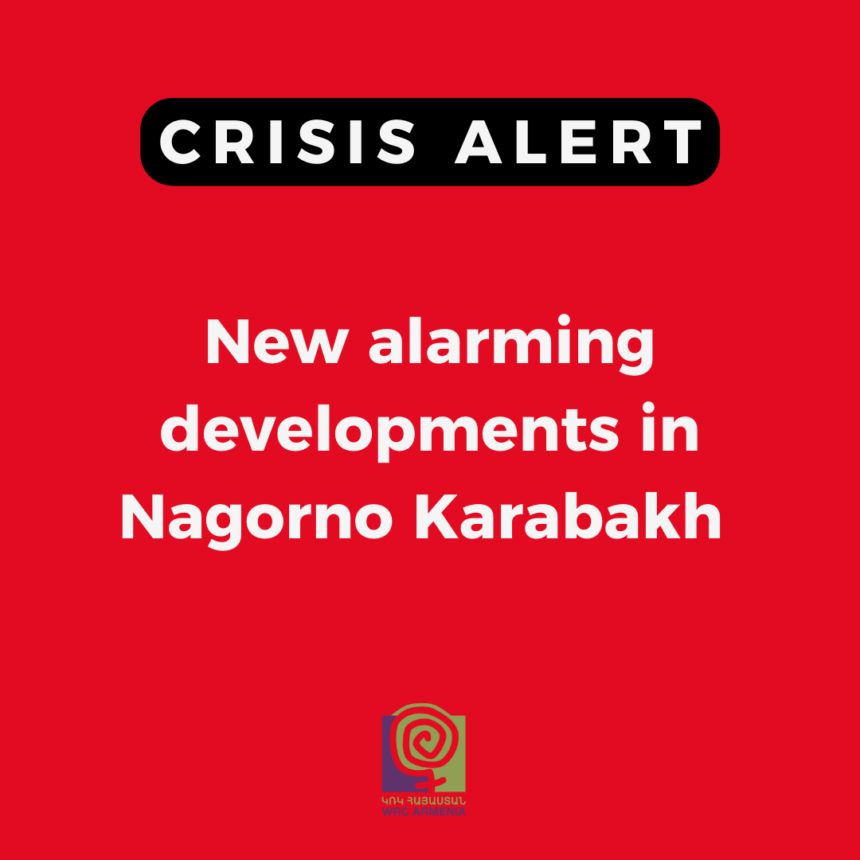Nagorno Karabakh (Armenian name Artsakh) has been under blockade by Azerbaijan since December 12, 2022, and for more than seven months its native Armenian population has experienced food, fuel, and other supplies shortages, gas, electricity, water outages, and medical emergencies in failing local hospitals. The International Committee of the Red Cross is the only international organization to have access to the region. It transports patients in urgent need of care to Armenia (more than 680 since December 2022), yet Azerbaijan has also targeted the work the ICRC does, delaying and denying medical care to patients from NK. For the past couple of weeks, even the ICRC has not been able to deliver humanitarian aid to NK. The food shortage in NK is turning into a humanitarian catastrophe by the hour, there are long lines for basic food items and locals report staying in lines for four hours and returning home empty-handed. The large humanitarian aid sent by the government of Armenia is being held at the border for the past several days with no permission to enter the territory of NK to deliver the necessary emergency help.
The blockade started with astroturfed ‘’eco-activist’’ protests which were directly sponsored by Baku and administered by the Azerbaijani military and were accompanied by anti-Armenian signs and slogans. Then in April Azerbaijan installed a checking point between the Armenian and Azerbaijani border, on the Lachin Corridor and declared that NK Armenians needed to pass by this point to travel in and out of the region. However, earlier this year the International Court of Justice ordered Azerbaijan the following, “Azerbaijan shall take all measures at its disposal to ensure unimpeded movement of persons, vehicles, and cargo along the Lachin Corridor in both directions.’’ According to the November 9th, 2020 ceasefire agreement, the Russian peacekeeping force is the one responsible for the Lachin Corridor, the checkpoint installed by Azerbaijan is in direct violation of the agreement. Azerbaijan virtually controls supply routes to NK which means the deliberate starvation of the Armenian people there is part of warfare, psychological or otherwise.
On June 15 following a shootout between Armenian and Azerbaijani troops near the Lachin Corridor, Azerbaijan banned all humanitarian passenger and cargo transport through the corridor which was carried out, in limited quantities, by Russian peacekeepers and the ICRC. Baku thus significantly aggravated the shortages of basic foodstuffs which have been rationed by local authorities since January of this year. It is also important to point out how Baku uses the checkpoint it illegally established in April. On July 29, an Armenian resident of NK, a 68-year-old man was detained at this checkpoint by Azerbaijani forces while being transported under the supervision of ICRC to Yerevan for medical treatment. Despite several calls and official requests, he is still held in Baku and will be prosecuted on false, made-up charges. He is accused of participating in military operations during the First NK War. If participating in military operations would be grounds for prosecution the majority of the male population of NK who participated in military operations during the entirety of the conflict could be prosecuted by the Azerbaijani government. Azerbaijan has moved on to criminalizing the male population of NK and is adamant about prosecuting anyone who they might get their hands on which will incite more violence and does not contribute to the negotiations process. There needs to be an independent commission that investigates war crimes committed by both sides during the conflict, the Azerbaijani government does not have any credibility to do this by themselves.
Poverty and shortages uniquely affect women and girls because of their social mobility and position in society. Most recently tragedy struck the unrecognized republic when a mother of two- three and six years old- left the sleeping children in their house to travel by foot to a neighboring city for food only to come back and find that the children had disappeared. The next day the children were found dead from heatstroke in a car in the town of Martakert where they walked to in search of their mother.
For the past eight months, the Armenian population under the blockade now has had no access to hygiene products and medications. It is evident that medicine shortages have had adverse effects on women’s reproductive health. Due to the blockade, the ‘’Mother and Child Health Care Center’’ in Stepanakert reported a concerning trend in recent months: losses in the early stages of pregnancy have nearly tripled and there was a significant increase in perinatal mortality rates. This distressing situation is attributed to two main factors: the highly stressful circumstances and a lack of access to a balanced diet. Sexual and reproductive health services for women are limited and inaccessible, violating their human rights: also, remember that during the 2020 war, Azerbaijan targeted the maternity ward in Stepanakert. The two above-mentioned examples do not necessarily represent the dire situation in NK, we and our partners have not had access to the region for seven months now in order to monitor issues relevant to women’s rights on the ground.
Taking into consideration the catastrophic situation in NK the WRC urges:
- The international community, including our partners and decision-makers in foreign governments as well as international organizations, to pay attention to and recognize this humanitarian crisis unfolding in the unrecognized republic of Nagorno Karabakh.
- Urgent intervention is needed to ensure that the affected civilians receive the necessary humanitarian assistance and protection. The international community must put pressure on Azerbaijan to unblock the Lachin corridor, the sole road connecting Armenia to Nagorno Karabakh.
- Release of all illegally detained civilians and return of prisoners of war
- Finally, international organizations including UN bodies to ensure local presence in Nagorno Karabakh to monitor further developments and to prevent the crisis from turning into ethnic cleansing campaigns.
 Legal advice
Legal advice

Leave a Reply